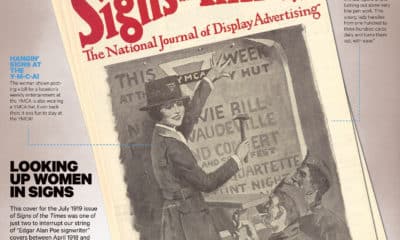In a decision that should bolster content neutrality for the entire sign industry, the Supreme Court of the US (SCOTUS) has unanimously decided in favor of the plaintiff in its decision on Reed v. Town of Gilbert. The plaintiff in the case, the Rev. Clyde Reed, pastor of Good News Community Church in Gilbert, AZ, posted signs in public rights-of-way advertising the church’s services. However, the city ordered him to remove the signs, and cited local ordinances that permitted signs for religious organizations to be posted only 12 hours before through one hour after the event. However, Gilbert permitted much larger signs with much longer permitted durations for political and homeowner-association signage, for example.
Rightfully upset about the discrepancies in the city code, Reed sued the city. He contacted the Alliance Defending Freedom (ADF), an organization that litigates freedom-of-speech and religious-liberty cases. The District Court that initially heard the case sided with the city of Gilbert, however, and the Ninth Circuit Court of Appeals upheld the original decision. However, Reed and ADF pressed forward and filed to be placed on the SCOTUS docket. Last summer, SCOTUS agreed to hear the case. In mid-January, both sides pleaded their case before the justices.
The syllabus that SCOTUS issued declaring its ruling offered several summary points that underscore the court’s decision. They include:
"The Sign Code’s content-based restrictions do not survive strict scrutiny because the Town has not demonstrated that the Code’s differentiation between temporary directional signs and other types of signs furthers a compelling governmental interest and is narrowly tailored to that end … The Town cannot claim that placing strict limits on temporary directional signs is necessary to beautify the town when other types of signs create the same problem."
"The Ninth Circuit also erred in concluding that the Sign Code was not content based because it made only speaker-based and event-based distinctions." The Code’s categories are not speaker-based — the restrictions for political, ideological and temporary-event signs apply equally no matter who sponsors them."
In a statement issued by the International Sign Assn. regarding the statement, David Hickey, the organization’s vice president of government relations, said, “This ruling certainly offers clarity on the idea of regulation of temporary signs. It does not provide a how-to guide by any stretch. This is an issue that communities struggle with: balancing constitutional rights and community aesthetics with business and nonprofit needs to use this type of signage.”
Advertisement
ST will cover the Reed decision in greater depth in our August issue.


 Photo Gallery1 week ago
Photo Gallery1 week ago
 Ask Signs of the Times2 weeks ago
Ask Signs of the Times2 weeks ago
 Paula Fargo1 week ago
Paula Fargo1 week ago
 Real Deal4 days ago
Real Deal4 days ago
 Photo Gallery1 week ago
Photo Gallery1 week ago
 Women in Signs2 weeks ago
Women in Signs2 weeks ago
 Women in Signs1 week ago
Women in Signs1 week ago
 Signs of the Times1 week ago
Signs of the Times1 week ago















